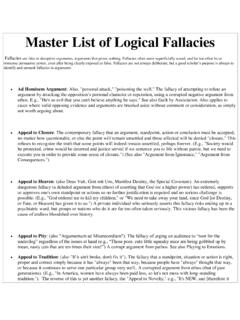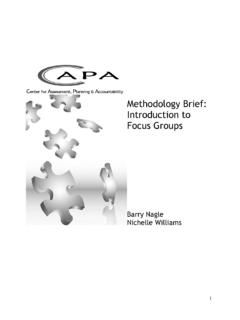Transcription of Advantages and Disadvantages of Study Groups
1 Advantages and Disadvantages of Study Groups Are Study Groups for you? Your learning style inventory suggested whether you prefer to Study alone or in a group . If you do like working in Groups , forming a Study group for a particular class may be a great help to you. Even if you usually like to Study alone, you may find a Study group helpful in particular circumstances, such as doing math problems or predicting test questions. As with almost everything, Study Groups have Advantages and Disadvantages . Advantages of Study Groups : A. If you are a procrastinator about studying, you will at least spend time studying with the group . Even then, having a sense of obligation to the group may motivate you to prepare better on your own.
2 B. You will learn actively by talking about course information and participating in learning activities. C. Explaining to someone else is a great way to deepen your own understanding. Tutoring a weaker student reinforces your knowledge. D. Other students will give you additional ideas about the information and are likely to broaden the range of predicted test questions. Even the answers to questions will vary somewhat and give you additional thoughts for your own answers. E. The routine "work" in preparing Study materials can be shared. The tasks of making Study aids and essay outlines can be divided and shared. For example, vocabulary "flashcards" can be written out on two sides of standard size paper, 8 to a side.
3 Then the sheets can be duplicated on a copier, one for each member of the group , and cut apart. Or predicted essay questions could be divided among the group members, and each member would write outlines to be duplicated and shared. Then the group could discuss and "improve" them all. It is important for the group to establish criteria for a good answer. Answers should not take hours to produce. Develop an answer that is complete and could be easily written during the time allotted on the exam. Some students feel pressured to produce too much to ensure that the other members of the group will be impressed. Don't get caught in that bind.
4 This activity is designed to teach you how to work as a team, to share responsibility, learn from one another what goes into a good answer, and help each person save time. Sharing the work does save time and give additional ideas. However, be aware that studying someone else's Study sheets or outlines in not as good for learning the information as making them yourself from scratch. Remember that "the doing is the learning". For that reason, when tasks are being divided, choose those topics where you need the most Study time. F. You may feel less discouraged and alone when you see other students also having to work hard to learn the course material.
5 Disadvantages of Study Groups : A. Unless everyone is serious, group Study sessions can often turn into social events where very little Study occurs. B. Studying with people who have negative attitudes will work against you. The "None of us understands this and we can't all fail" attitude is common but deadly. C. If another group member does not prepare for the group sessions by studying alone, your time may not be effectively used in group meetings. If you are studying with someone who has not read the material carefully or attended class regularly, you will waste time reviewing basic definitions and facts that you already know, instead of focusing on more challenging topics.
6 D. If the group contains students of widely ranging ability, you may not benefit much. If the others are on a level far beyond your own, you'll soon be left in the dust and be more discouraged than ever. On the other hand, if the other students are too far beneath your level, you may enjoy being the "Brain" of the bunch but miss the point of the group --the challenge of other minds do spur you on. E. You may grow to depend upon the group and not feel you can "make it" on your own. Be sure to spend sufficient time studying alone. The group Study time cannot accomplish all your Study needs. Things to Consider When Setting up a Study group A. Seek a small group of students who seem motivated, responsible and reasonably capable.
7 Some people like just one Study partner; consider five others as a maximum. Probably two or three others is best. B. Watch for people who remain conscious, ask questions and take notes during class. Ask these students if they want to participate in a Study group . Suggest to two or three others that you meet for coffee and talk about group goals, meeting times, and other logistics. You don't have to make an immediate commitment. You can look for people who face similar academic or personal challenges. For example, if you are divorced and have two toddlers at home, you might look for other single parents who have returned to school. C. Study Groups take various forms.
8 Some meet weekly on an informal basis in private homes, restaurants, parks, or empty classrooms. Some Groups consist of two or three students who Study together regularly and quiz each other on key terms and concepts. Other Groups form and meet mostly at exam time. D. Be sure to set up ground rules about logistics and tasks. Agree on when and where to meet, how long to meet, what each person will do to prepare for the session, and what will happen during the session. The best Study Groups have an agenda and each member prepares a Study task for the group . For example, each group member can agree to bring four or five predicted test questions to each meeting; then you can all take the test made from these questions.
9 Or you can each review a lecture and make vocabulary cards. Practice doing extra math problems together. Set aside ten minutes to conduct a group brainstorm of possible test questions. You can make a "Test Questions" section of your notebook. Things to Consider When Setting up a Study group .. E. Here's an illustration of how a Study session might operate. Four of you in your Biology class decide to Study together for your upcoming midterm. You agree to meet in the small Study room in the Learning Center (it has few distractions) Thursday afternoon at two, and one person takes responsibility for reserving the room. There are four units to be reviewed for the test, so each of you takes responsibility for reviewing the notes and chapters for one unit and preparing four copies of a two-to-four page Study sheet for the unit.
10 You choose the section to prepare that you feel weakest on so that you will get the most practice where you need it. During the session, each of you in turn presents your summary and explains it. People ask questions and make additions as each summary is presented, including asking questions that they think might be on the exam. You all try to determine the answers from your notes and the text, making notes on what you learn. After an hour or so, you take a ten-minute break, and then get back to work. As this example shows, group Study can be a very effective way to Study if (and only if) everyone does what he or she has agreed to do. Another way to take advantage of the knowledge pooled in such a group is to use a round-robin question technique.










